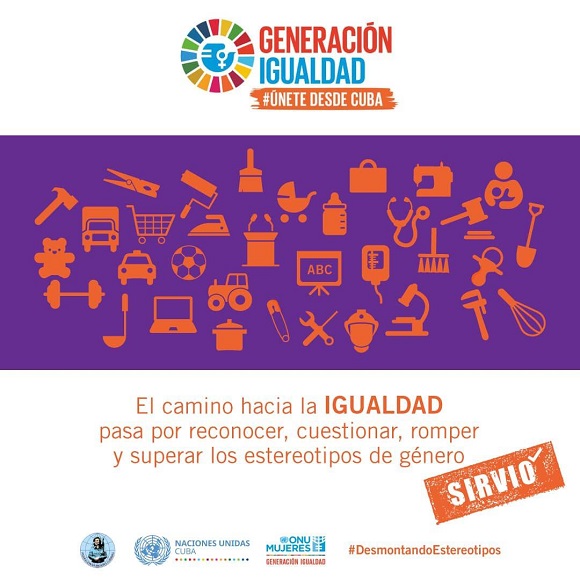Image: Generation Equality.
In Cuba,
more than 95 percent of people between the ages of 15 and 74 reproduce at least one gender stereotype.
Obtained by the most recent National Survey of Gender Equality (ENIG-2016), the data, suddenly, alarm.
Seeing it from the perspective of the challenge it represents can help explain the acid discussions generated around the recently approved Family Code and some of the troglodyte reactions that accompany the publication of many of these "Letters...".
It also helps to clarify why respected specialists, with very diverse profiles, position the dismantling of patriarchal myths and beliefs at the very center of the challenges for the implementation of all these legal regulations that Cuba has been building to prevent and address gender violence. .
And it is that the stereotypes, those ideas, prejudices, norms that we learn from childhood about what it is to be a man or a woman, impact the lives of all people and are at the very origin of not a few discriminations and violence for reasons of gender.
What are we talking about?
The ENIG-2016 provided many insights in this regard.
Developed jointly by the National Office of Statistics and Information (ONEI) and the Center for Women's Studies (CEM), of the Federation of Cuban Women (FMC), the research scrutinized persistent myths in Cuban society today.
Image: Generation Equality.
For example, between 96 and 99 percent of the people interviewed identified being a secretary, cleaning assistant, nurse, caregiver of others, preschool teacher, and high-level leader as suitable occupations for women.
In parallel, the trades of electrician, bricklayer, mechanic, carpenter and plumber are only considered "adequate" for them by less than 39 percent of the population.
In the case of men, the vast majority of those who answered the questionnaire (99 percent) considered that almost all trades are suitable for them: carpentry, being a high-level leader, plumbing, mechanics, being a policeman/soldier , fisherman, sailor, fireman, bus driver, airplane pilot, electrician, bricklayer and field worker.
Meanwhile, among the least suitable they identify cleaning assistant (45.3 percent) and secretary (31.3 percent).
Image: Generation Equality.
As if that were not enough,
44.8 percent of the men interviewed "agree" or "agree in part" that they are better at making decisions.
Meanwhile, the vast majority of people (65 percent) continue to link the expression of affection to femininity and, along this path, around 60% of the population agree that babies need more closeness from the mother than from the father.
These are just a few examples of statistical data that needs second, third and many more looks.
And act accordingly.
Cuba's own National Report for Beijing+25, of 2021, has identified the prevalence of gender stereotypes as one of the obstacles to "a more accelerated advancement of equality."
Image: Generation Equality.
Paths to real equality
The campaign "Generation Equality-Unite from Cuba" deals with stereotypes, built jointly by the United Nations System in Cuba and the Federation of Cuban Women.
Almost set in motion at the end of 2019, under the umbrella of a global campaign launched by UN Women and as a continuity initiative of the UNiTE Campaign of the patio, the COVID-19 pandemic confined it to social networks and only last year has it resumed more “face-to-face” initiatives and new products.
The campaign is based on recognizing the negative impact of gender stereotypes on the lives of women and men, and identifies them as catalysts for discrimination and violence.
Thus, it includes products for social networks and a self-diagnosis, as tools to promote debate mainly among young audiences.
Three audiovisual capsules made from journalism tools are intended to serve as tools to "look inside", facilitate debate and promote change.
Advances and challenges in the implementation of the 2030 Agenda for Sustainable Development, economic empowerment of women and dismantling gender stereotypes, are the three thematic lines of the campaign, whose
main target audience is youth between 18 and 30 years old.
Osmayda Hernández, a member of the FMC's National Secretariat, commented during a workshop held last November at the José Martí International Institute of Journalism (IIPJM), that the women's organization "has a national network capable of taking the campaign to all the country”, including universities, research centers, technical schools and other youth spaces.
The focus is on continuing to cultivate alliances and take it to scenarios from which the training of other people can be promoted, it emerged during the IIPJM work session.
“It served”, that word repeated over and over again by young people in WhatsApp conversations and friends' parties;
Shouted from a distance from a bus window or used to evaluate the latest series and even the most recent class of a good teacher, it serves as a wink to deconstruct the myth of "Generation Equality-Unite from Cuba",
a campaign, still ongoing, but that, definitely, also “served”.
